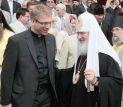Patriarch Kyrill of Moscow receives Secretary General of the World Council of Churches
 In Moscow, on June 28,2010, His Holiness Patriarch Kirill of Moscow and All Russia met with Dr Olav Fyske Tveit, the Secretary General of the World Council of Churches (WCC). His Holiness explained to Dr Tveit why Orthodox are alienated from the ecumenical organisation. Patriarch Kirill said that the WCC is in the midst of a protracted crisis, according to the MP official website. He believes that it is caused by the contradiction between a declared desire for Christian unity and the exacerbation of differences among Christians on some questions, particularly in the area of morality. The Patriarch said that attempts to alter the rules of Christian morality within some Protestant communities contribute to the alienation of the Orthodox from the WCC. Orthodox must attend to such currents; otherwise, it would be a departure from the truth and become the grounds for contention amongst the Local Orthodox Churches.
In Moscow, on June 28,2010, His Holiness Patriarch Kirill of Moscow and All Russia met with Dr Olav Fyske Tveit, the Secretary General of the World Council of Churches (WCC). His Holiness explained to Dr Tveit why Orthodox are alienated from the ecumenical organisation. Patriarch Kirill said that the WCC is in the midst of a protracted crisis, according to the MP official website. He believes that it is caused by the contradiction between a declared desire for Christian unity and the exacerbation of differences among Christians on some questions, particularly in the area of morality. The Patriarch said that attempts to alter the rules of Christian morality within some Protestant communities contribute to the alienation of the Orthodox from the WCC. Orthodox must attend to such currents; otherwise, it would be a departure from the truth and become the grounds for contention amongst the Local Orthodox Churches.
Speaking about the prospects of a policy change in the WCC, Patriarch Kirill said, "All Christians understand that it is important to ensure the preservation of Christian civilisation and to facilitate the construction of good relations with other civilisational communities. The WCC can help achieve these goals through the protection of Christian values and promoting a Christian dialogue with other religions and secular ideologies". His Holiness thinks it that it is necessary to protect Christianity from certain secular trends, ones that propagate an anti-Christian spirit in the world.
 In his turn, Rev Tveit recognised that the ecumenical movement is in crisis. He expressed his hope for continued dialogue in the WCC on the questions raised [by His Holiness]. According to Rev Tveit, the member-churches of WCC can be overcome their differences on a broad range of problems with a process of fair and open debate. The membership of the WCC is made up of various Orthodox and Protestant bodies. Ecumenical dialogue, that is, communication and collaboration between the Orthodox Churches with Catholics and Protestants, causes concern and dissatisfaction amongst some Orthodox. Some of them are afraid that such cooperation will lead to a mechanical unification of churches. The consequence would be a falling away from the Truth of the Orthodox Church, and the True Church would only then be only a small handful of people. In any case, there are no longer ecumenists who defile the Church with involvement in joint prayer together with Catholics and Protestants. Nevertheless, some Orthodox do not understand why we need to cooperate with Catholics and Protestants. They point up that the ancient Church Fathers denounced heretics, rather than trying to find common ground with them on issues of morality.
In his turn, Rev Tveit recognised that the ecumenical movement is in crisis. He expressed his hope for continued dialogue in the WCC on the questions raised [by His Holiness]. According to Rev Tveit, the member-churches of WCC can be overcome their differences on a broad range of problems with a process of fair and open debate. The membership of the WCC is made up of various Orthodox and Protestant bodies. Ecumenical dialogue, that is, communication and collaboration between the Orthodox Churches with Catholics and Protestants, causes concern and dissatisfaction amongst some Orthodox. Some of them are afraid that such cooperation will lead to a mechanical unification of churches. The consequence would be a falling away from the Truth of the Orthodox Church, and the True Church would only then be only a small handful of people. In any case, there are no longer ecumenists who defile the Church with involvement in joint prayer together with Catholics and Protestants. Nevertheless, some Orthodox do not understand why we need to cooperate with Catholics and Protestants. They point up that the ancient Church Fathers denounced heretics, rather than trying to find common ground with them on issues of morality.
Sources: Voices from Russia, Metropolitanate of Montenegro and the Littoral

